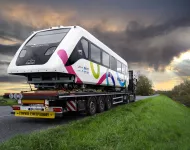An innovative railway project led by a French consortium and the Institut Mines-Télécom
ECOTRAIN was designed by Philippe Bourguignon and developed by a consortium of French manufacturers Groupe Stratiforme-Compreforme-Technoforme, Socofer France, CLEARSY, Syntony GNSS in collaboration with two schools from the Institut Mines-Télécom (IMT): IMT Mines Albi and IMT Nord Europe.
To represent the work carried out at IMT Mines Albi, Eva Petitdemange, a lecturer and researcher at the Industrial Engineering Center (CGI), was present during the exhibition at the Élysée Palace.
IMT Mines Albi's contribution to the development of a low-carbon shuttle bus
IMT Mines Albi has made a major scientific contribution to ECOTRAIN through its training and research centers, which specialize in future technologies and sustainable systems.
Industrial Engineering Center (CGI): decision-making tools for rural mobility
The Industrial Engineering Center (CGI) has developed decision-making tools that enable:
• evaluate the integration of an autonomous rail shuttle in rural areas,
• analyze possible operating scenarios,
• optimize the deployment of a sustainable mobility solution.
This work reinforces the relevance of ECOTRAIN as an innovative response to the challenges of opening up access and local mobility.
RAPSODEE UMR CNRS 5302 Center: expertise in energy storage and smart battery management
The RAPSODEE UMR CNRS 5302 Center, which specializes in energy processes and electricity storage, played a key role in designing the battery system for the ECOTRAIN shuttle, which is essential for ensuring low-carbon rail mobility.
The teams conducted:
• a study of the regulatory framework,
• a comparative analysis of storage technologies,
• an assessment of ECOTRAIN-specific usage scenarios,
• a comprehensive technical and economic study of the energy system,
• as well as advanced research using AI and reinforcement learning to optimize battery management and improve energy performance.
These advances make it possible to imagine smarter, more efficient, and more environmentally friendly rail systems.
Institut Clément Ader UMR CNRS 5312 Albi site: designing composite rails for a lighter, more sustainable network
On the infrastructure front, the Institut Clément Ader UMR CNRS 5312 Albi site is confirming its expertise in advanced materials by contributing to the Infralight project, dedicated to the development of composite rail tracks. These new-generation rails, which are lighter, stronger, and easier to deploy than traditional metal rails, offer an innovative solution for revitalizing the rail network in rural areas, which often face high maintenance costs and a lack of adaptability. Thanks to its expertise in the forming, characterization, and durability of composite materials, ICA designs infrastructure solutions that reduce costs, facilitate modernization operations, and improve the overall performance of railway lines. This work is part of a transition towards more sustainable, lightweight infrastructure that is adapted to the real needs of the regions.
IMT Mines Albi: a key player in the sustainable mobility of tomorrow
Through its active participation in the ECOTRAIN project, IMT Mines Albi confirms its major role in research and innovation in the areas of sustainable mobility, low-carbon energy, and future rail technologies. This collaborative work perfectly illustrates the school's mission: to design sustainable and innovative solutions alongside industrial players to meet the major challenges of ecological transition.


